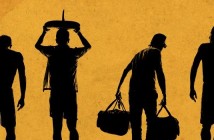
Director: Enrico Cerasuolo
Genre: Documentary
Official Website: http://www.lastcallthefilm.org
Editor’s Notes: The following review is part of our coverage for the 14th Annual Planet in Focus Film Festival which runs from November 21st to 24th in Toronto. For more information on the festival visit planetinfocus.org and follow Planet in Focus on Twitter at @PlanetinFocus.
The realities of exponential growth in the human population create discomfort in their grave implications as the world’s space and resources are finite and the overpopulation of any species has the potential for devastating effects, but when the human equation enters the picture cold objectivity becomes difficult because it forces humanity to stare in the face of its inevitable mortality. Having supposed domain over our surroundings and possessing what we believe to be the unique trait of consciousness, we have a specialized ability to comfort ourselves with short-sighted lies and the dubious notion that we are divinely unique and immune to obsolescence or catastrophic overpopulation. It will always work out for humanity, we shining creatures of evolutionary achievement and complete obliviousness to the logical interconnectivity the complex systems that govern the parameters of our existence. This arrogance that has allowed humanity to declare its incontestable supremacy could ultimately lead to our own extinction if we do not face the problems of the world with uncomfortable objectivity, but potential solutions are damning to the current notions of freedom and such concessions go against evolutionary stubbornness forged from countless cycles of competitive evolution. We are Earth’s darlings, and we will not be subjugated by the popular trends of kooky scientists and their tendency to possess the idiosyncratic personality defect of global awareness. Last Call explores the problems facing humanity and the obstinate aversion to subordination that clouds our ability to see these problems with appropriate impartiality as we illogically march toward our own destruction, as well as tell the fascinating story of a team of six men and women who changed the global language surrounding issues like environmentalism, economics, and the devastating impacts of overpopulation with their controversial book, The Limits of Growth.
Last Call explores the problems facing humanity and the obstinate aversion to subordination that clouds our ability to see these problems…

Last Call begins with a simple demonstration as scientist and co-author of The Limits of Growth, Dennis Meadows, invites both live attendees and viewers of the film to cross their arms. Through multiple crossings we become aware of the fact that our actions are at least partially dictated by involuntary habitual quirks as we cross them the same way every time. Attempts to cross our arms in the unpracticed fashion feel unnatural as we have spent our entire lives stuck in a methodological rut that “simply worked” for us. Through a silly exercise, Behrens makes us see the underlying obstinacy inherent in our nature and our intrinsic aversion to change. It is this obstinate nature that blinds us to the problems facing the world and makes us fearful of change, even if simple changes could mean the salvation of our species. Unfortunately most of our callow kind lack the proper perception to see problems on a global scale and the rippling effects of our actions through the entire world as certain issues are indifferent to the national demarcation points set by the many tribes of human animals with their myopic ignorance and gluttonous ways.
Last Call offers a gentle whisper of social protest, somewhat defanged by its lack of focus as it switches roles of biographical documentation of the people who wrote The Limits of Growth…
Last Call offers a gentle whisper of social protest, somewhat defanged by its lack of focus as it switches roles of biographical documentation of the people who wrote The Limits of Growth, to recounting the controversy it stirred as it altered global vernacular and forced us to react to the possibility of the catastrophic exponential growth of the human population, and the dangers that currently face humanity caused by overpopulation and our refusal to make simple concessions to improve our chances against these potential dangers. The film rapidly jumps back and forth between roles, never really giving us time to absorb the impact of its weighty subject matter before it goes back to pay a visit to some lovely eco-friendly cottage where one of the authors of Limits lives to listen reunited co-authors reminisce about the tumultuous days of the seventies and its cultural ignorance that we have still not completely outgrown.
We are shown archive footage of politicians grasping for easy populist stances in opposition of the ideas presented in Limits, delivering meaningless and carefully crafted speeches to affirm our own righteousness and farcically remind us of our freedom, preaching the merits of fossil fuels while willfully ignoring the unsustainability of this limited and noxious resource. We see graphical representations that offer conclusive proof of climate changes that have dramatically intensified in recent years, but the complexities of our impact on the world leave us with comforting doubt as the causes are beyond our comprehension and therefore we are exonerated of any unintentional wrongdoing and accidental trespasses against the world as we are innocent by way of universal ignorance. We are reminded of the unmitigated evils of Big Oil, but we kind of already knew of their potential for villainy but the fiends behind whatever power source that wriggles its way to dominance after all the dead dinosaur goop is finally gone will certainly be every bit as corrupt and evil as Big Oil; let’s just hope it manages to be more ecologically sound than its hilariously antiquated predecessor. Last Call makes salient points and its conversations with scientists and authors are fascinating, but a ninety minute runtime is simply too constricting for the comfortable allowance of its dizzying tangential elements as it ineffectually sends out a last call for reasoning and global perspective to a population incapable of acknowledging its own fatal flaws.
We may be standing at the precipice of the last few doublings of human population, but we won’t really change anything until we are forced to do so by urgent necessity. Try as we might, we simply can’t outsmart our own dumbassery, so I guess we’ll just have to see how this whole mess works itself out. We may find ourselves extinct. Things have a way of preserving equilibrium. Scarcity of goods or some global epidemic could force the population down to a reasonable size at horrific costs. Who knows, maybe this isn’t even the first major extinction event of a sentient humanoid species on this planet of ancient and undecipherable secrets. Maybe if we’re lucky we’ll leave enough traces of ourselves behind to become an easily depleted fuel source for some future species of sentient super-ants. I think I’ve gone off the rails a bit. See what nintey minutes of jarring shifts between historical documentation and intense humanoid guilt can do to a person??
[notification type=”star”]56/100 ~ MEDIOCRE. Last Call makes salient points and its conversations with scientists and authors are fascinating, but a ninety minute runtime is simply too constricting for the comfortable allowance of its dizzying tangential elements as it ineffectually sends out a last call for reasoning and global perspective to a population incapable of acknowledging its own fatal flaws.[/notification]



